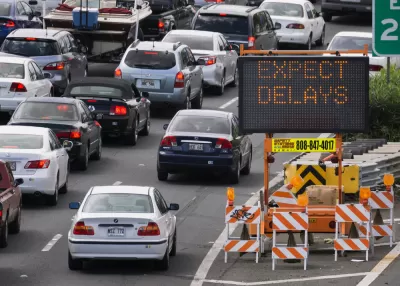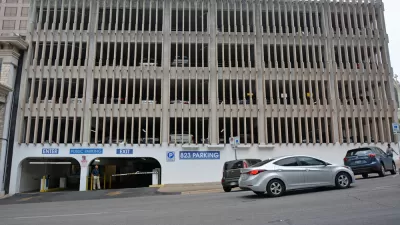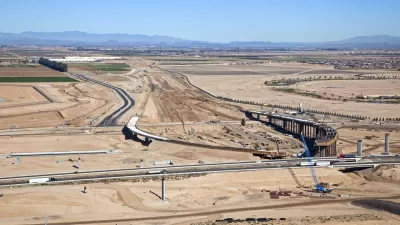Government played a big role in creating the car-centric United States that exists today. Climate change requires that government take the lead in reducing automobile dominance.

An article by Gabby Birenbaum poses the question in the headline, first summarizing the pressing need for Americans to drive less.
Data from the EPA shows that the transportation sector is actually the biggest source of pollution in the US, and that light-duty vehicles (or passenger cars) are responsible for 58 percent of those emissions.
Residents in the most urban areas, which theoretically should reduce per capita emissions by delivering the benefits of density: alternatives to automobile transportation and proximity to jobs. "According to a 2021 study published in Frontiers, Houston, Chicago, and Los Angeles have some of the highest per-capita emissions totals in the world," according to Birenbaum. "The study broke down cities’ emissions based on sector, using the most recently available data (from 2009 and 2010), and found a large portion of those emissions come from transportation."
Breaking the habit of driving to reduce carbon emissions is hard—despite the pressing need—because so many U.S. cities are built for driving. "Biking and walking are often not options, and public transit, where it exists, does not typically serve trips that do not involve going from a city’s outskirts to its downtown or back," writes Birenbaum.
Despite the depth and breadth of the challenge, Birenbaum focuses on the potential for local authorities to "create a safer, more democratized transportation ecosystem" and provide a significantly positive contribution to the effort to reduce carbon emissions. The prescriptions offered by Birenbaum, with more detail provided in the source article are: 1) Make streets safer for bikes and pedestrians, 2) end single family zoning to encourage mixed-use development, and 3) make drivers pay the cost of driving.
Notably, these prescriptions are seemingly diametrically opposed to the housing preferences of the majority of Americans according to the results of a post-pandemic survey by the Pew Research Center published earlier in the summer of 2021.
FULL STORY: How to end the American obsession with driving

Alabama: Trump Terminates Settlements for Black Communities Harmed By Raw Sewage
Trump deemed the landmark civil rights agreement “illegal DEI and environmental justice policy.”

Study: Maui’s Plan to Convert Vacation Rentals to Long-Term Housing Could Cause Nearly $1 Billion Economic Loss
The plan would reduce visitor accommodation by 25% resulting in 1,900 jobs lost.

Planetizen Federal Action Tracker
A weekly monitor of how Trump’s orders and actions are impacting planners and planning in America.

Wind Energy on the Rise Despite Federal Policy Reversal
The Trump administration is revoking federal support for renewable energy, but demand for new projects continues unabated.

Passengers Flock to Caltrain After Electrification
The new electric trains are running faster and more reliably, leading to strong ridership growth on the Bay Area rail system.

Texas Churches Rally Behind ‘Yes in God’s Back Yard’ Legislation
Religious leaders want the state to reduce zoning regulations to streamline leasing church-owned land to housing developers.
Urban Design for Planners 1: Software Tools
This six-course series explores essential urban design concepts using open source software and equips planners with the tools they need to participate fully in the urban design process.
Planning for Universal Design
Learn the tools for implementing Universal Design in planning regulations.
Caltrans
Smith Gee Studio
Institute for Housing and Urban Development Studies (IHS)
City of Grandview
Harvard GSD Executive Education
Toledo-Lucas County Plan Commissions
Salt Lake City
NYU Wagner Graduate School of Public Service





























